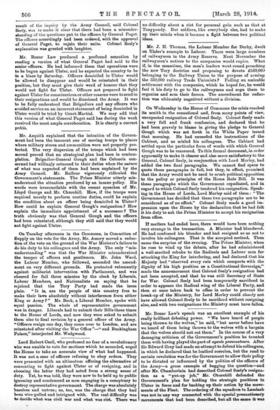Lord Robert Cecil, who professed no fear of a revolutionary
who was unable to vote for motions which he seconded, urged the House to take an accurate view of what had happened. It was not a case of officers refusing to obey orders. They were presented with an ultimatum offering the alternative of consenting to fight against Ulster or of resigning, and in choosing the latter they had acted from a strong sense of duty. Yet, be was told, they were now to be held up to public ignominy and condemned as men engaging in a conspiracy to destroy representative government. The charge was absolutely baseless and untrue; so, too, was the charge that they had been wire-pulled and intrigued with. The real difficulty was to decide what was civil war and what was riot. There was no difficulty about a riot for personal gain such as that at Tonypandy. But soldiers, like everybody else, had to make tip their minds when it became a fight between two political ideas.














































 Previous page
Previous page